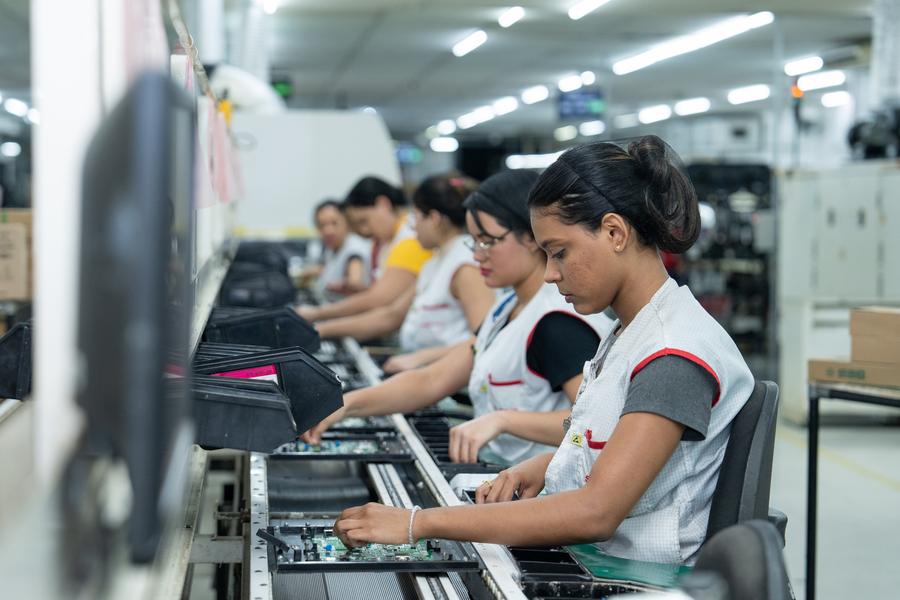Visitors tour the Brazil exhibition booth during the 2021 China International Fair for Trade in Services (CIFTIS) in Beijing, capital of China, Sept. 5, 2021. (Xinhua/Wang Tiancong)
For 50 years, China and Brazil have pursued a relationship grounded in a shared vision of mutual development, viewing each other's progress as an opportunity for their own growth.
by Xinhua writers Chen Weihua and Zhao Yan
RIO DE JANEIRO, Aug. 15 (Xinhua) -- As China and Brazil commemorate the 50th anniversary of their diplomatic relations, it is worth reflecting on what has become one of the most important partnerships within the Global South that features mutual respect, equality, and win-win cooperation.
As the largest developing countries and important emerging market economies in their respective regions, China and Brazil have no geopolitical conflicts or disputes over interests. Their economies are highly complementary and their interests are deeply intertwined. Their similar positions on international and regional issues represent a valuable strategic asset and shared interest.
For 50 years, China and Brazil have pursued a relationship grounded in a shared vision of mutual development, viewing each other's progress as an opportunity for their own growth.
This partnership, driven by a commitment to practical cooperation, has not only achieved remarkable leaps in economic cooperation but has also provided substantial support for the modernization efforts of both nations.
Workers operate on the production line at the SEMP TCL television factory in Manaus, capital of Amazonas state, Brazil, March 13, 2024. SEMP TCL is a joint venture established by Chinese electronics giant TCL Technology and Brazilian home appliance manufacturer SEMP. (Xinhua/Wang Tiancong)
Since 2009, China has become Brazil's largest trading partner and a major source of investment, while Brazil has become China's largest trading partner in Latin America. Chinese customs data have shown that the trade volume between China and Brazil reached 181.53 billion dollars in 2023, with Brazil becoming the first Latin American country to surpass 100 billion dollars in exports to China.
Beyond traditional manufacturing and goods trade, Chinese companies have actively participated in renewable energy projects in Brazil, including hydropower, solar, and wind energy. This involvement in green economic development has further diversified and advanced China-Brazil investment cooperation.
The two countries are also aligning their development strategies and expanding cooperation in cutting-edge areas such as energy transition, digital economy, low-carbon and smart agriculture, biotechnology, information technology, artificial intelligence, and aerospace.
Cultural exchanges between China and Brazil have also thrived, strengthening the friendship between their people. To celebrate the 50th anniversary of diplomatic relations, the Brazilian city of Recife has designated 2024 as the "Year of China" to foster a conducive environment for cultural relations.
A woman shows a folding fan she made during celebrations for the upcoming Chinese Lunar New Year at a park in Recife, Brazil, Feb. 3, 2024. (Xinhua/Wang Tiancong)
Brazilian music, literature, and films are gaining popularity in China. Brazil was invited as the guest of honor at the Beijing International Film Festival, where Brazilian films were showcased to Chinese audiences.
After overcoming various challenges over the past half-century, China-Brazil relations have gained significant strategic importance and global influence. The overall strength of their relationship has become increasingly evident.
In a rapidly changing world, China and Brazil are strengthening strategic cooperation within multilateral frameworks like the UN, G20, BRICS, and the WTO to amplify the voices of developing countries and safeguard the interests of emerging markets. Their joint six-point consensus on the Ukraine issue has gained recognition from a growing number of countries.
As both nations look toward a shared future, they have the opportunity to draw on past successes as a foundation for progress. By enhancing their mutually beneficial cooperation, they can together pave the way for the next "golden 50 years" of bilateral relations.







 A single purchase
A single purchase









